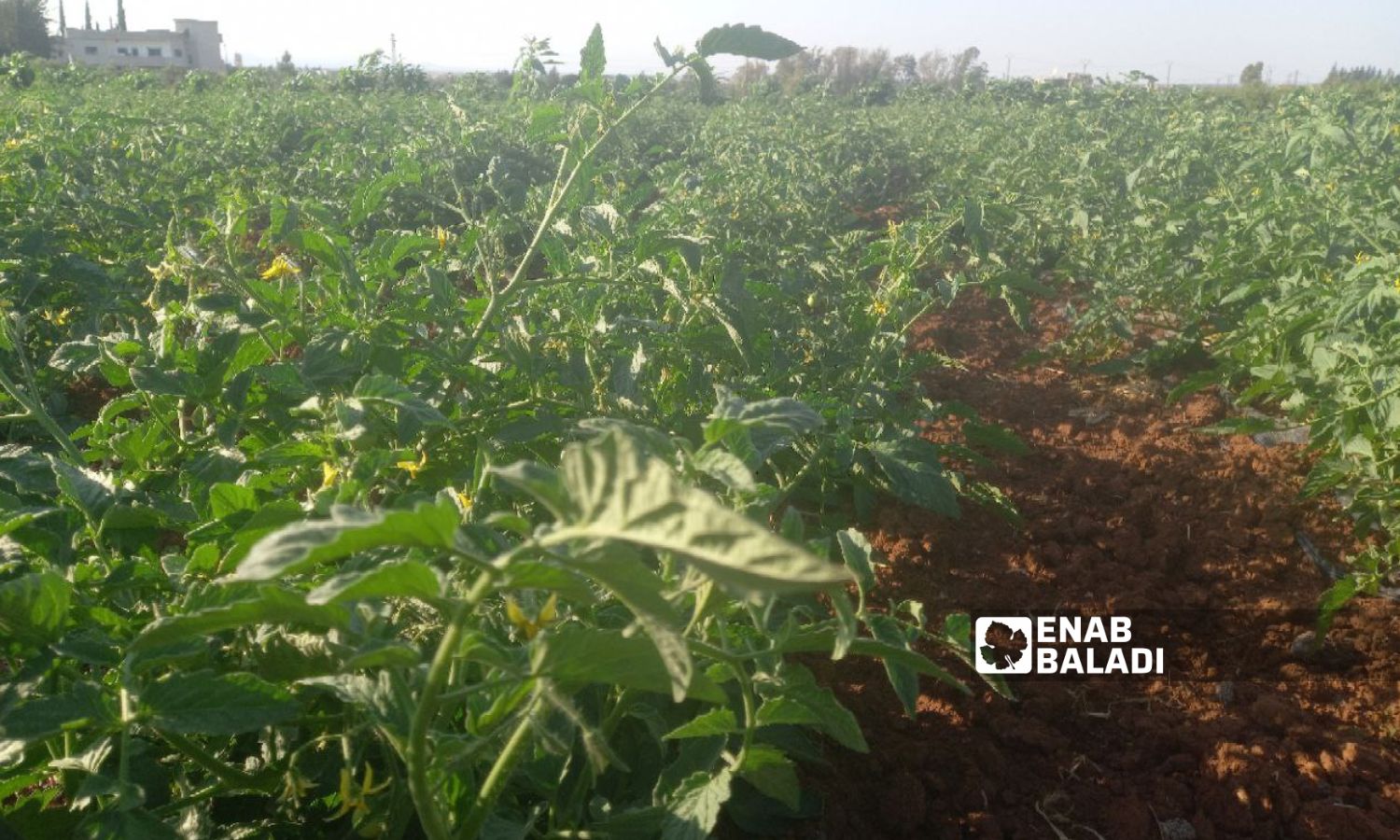



Daraa – Halim Muhammad
The high cost of agricultural medicines deprived farmers of a profit margin in the southern governorate of Daraa, especially with the fluctuations in the exchange rate of the Syrian pound and the high costs of labor and fuel prices.
Saleh, 25, complained about the poor financial returns of his cucumber crop, despite the fact that he sold the crop at a price of 3,000 Syrian pounds per kilo.
Saleh attributes the reasons for the low income to the production costs of medicines, fertilizers, and manpower in the Daraa countryside.
He told Enab Baladi that the prices of medicines have doubled from the previous season, and most agricultural pharmacies sell medicines based on the dollar exchange rate.
The price of some types of medicine reaches $100 per liter, and the cheapest ones are not less than $15.
($1=10,000 SYP) according to the S-P Today website, which covers the trading rate of the Syrian pound to the dollar.
Despite the increase in the costs of spraying agricultural pesticides, Saleh is still sticking to spraying his crop, expecting additional financial losses if the prices of agricultural medicines continue to rise.
Saleh’s cucumber crop needs one spray per week, explaining that the crop should be sprayed more intensively and at shorter intervals if there is an injury to the crops.
Therefore, he is keen to spray the crop periodically to prevent diseases, and each drug sprayer costs 750,000 Syrian pounds.
Abdul Karim, 55, a farmer in rural Daraa, is now unable to spray agricultural pesticides on pomegranate trees continuously, according to the instructions of the agricultural engineer, and he has started spacing between sprays to avoid the costs of pesticide spraying.
He told Enab Baladi that he delayed the spraying dates for a whole month, as each drug spray costs about 600,000 Syrian pounds, at a minimum.
According to what is known, the sprinkler can accommodate 1,000 liters of water, to which medicine is added. It is enough to spray five dunums of trees and the same amount of vegetables, such as cucumbers and tomatoes.
Vegetables are considered more sensitive to diseases, and they need successive sprays at close intervals, and the cost of their medicines is higher because fungal and spider medicines are more expensive.
The cost of spraying is not limited to the price of medicines, but the agricultural sprayer’s wages have increased, reaching 75,000 Syrian pounds, as it did not exceed 30,000 pounds during the last season, according to what Abdul Karim said.
The high price of a liter of diesel fuel, which reached 7,500 Syrian pounds, contributed to the increase in the cost of sprinklers in the local market, as well as the rise in maintenance fees and the change of mineral oil, tires, and others.
Labor wages have also increased, as one sprayer needs four workers, each of whom is paid 15,000 Syrian pounds.
Borrowing medicines from agricultural pharmacies, and paying for them after harvesting the crop, is one of the customs among farmers, and payment is in dollar value, just as the medicine seller proves his debts in dollars.
The collapse of the Syrian currency raises concerns among farmers, and the lower the value of the Syrian currency, the higher the cost of paying for medicines, according to a number of farmers interviewed by Enab Baladi.
“The profits go to the agricultural pharmacy,” said Mahmoud, 40, who grows tomatoes, eggplants, and zucchini in the Daraa countryside.
Mahmoud borrows the price of agricultural medicines, with his fears of the continued deterioration of the Syrian currency, and therefore the high payment bill will cause losses to his seasons.
Bashar said, “With every currency collapse, the value of the medicine bill becomes greater, and I am afraid that the high costs will negate my profit margin.”
Bashar owns a five-dunum pomegranate farm, which is his only source of income.
Daraa farmers sell their produce in the Syrian currency, whether in the al-Hal markets or by “guarantee” to merchants, which is selling the crop before it is harvested for an amount agreed upon by both parties.
Agricultural engineer Khaled Suleiman stressed the need to follow a periodic control program, called preventive spraying, to avoid infection of the crop with insect pests and fungal diseases.
Thus, it needs more treatment sprays at close intervals to treat the crop.
Suleiman said that the farmer must follow up his crops with a specialized agricultural engineer, and he must choose the types of reliable medicines, as some types are not free of fraud.
The most important diseases that crops are exposed to in Daraa, according to Suleiman, are powdery mildew, downy mildew, cotton aphid, whitefly, spiders, scale insects, and thrips.
Daraa is considered one of the agricultural governorates, as it produces basic crops such as tomatoes and leafy vegetables, as well as fruits such as pomegranates and grapes.
The Daraa Agriculture Directorate estimated the governorate’s production at 250,000 tons of tomatoes, and the cultivated areas amounted to 2,600 hectares, while the summer vegetable cultivation area is 1,765 hectares.
if you think the article contain wrong information or you have additional details Send Correction